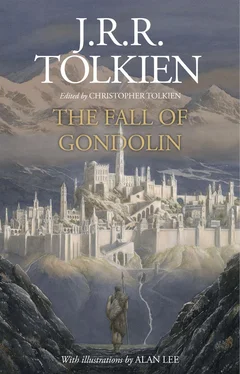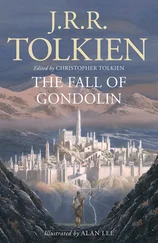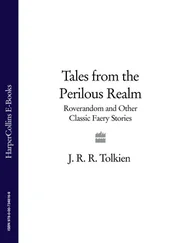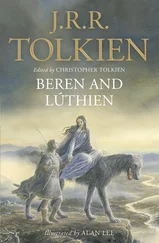In view of the purpose of its inclusion I have omitted passages that are not here relevant, and here and there made other minor modifications and additions for the sake of clarity. My text opens at the point where the original ‘ Sketch ’ begins.
After the despatch of the Nine Valar for the governance of the world Morgoth (Demon of Dark) rebels against the overlordship of Manwë, overthrows the lamps set up to illumine the world, and floods the isle of Almaren where the Valar (or Gods) dwelt. He fortifies a palace of dungeons in the North. The Valar remove to the uttermost West, bordered by the Outer Seas and the final Wall, and eastward by the towering Mountains of Valinor which the Gods built. In Valinor they gather all light and beautiful things, and build their mansions, gardens, and city, but Manwë and his wife Varda have halls upon the highest mountain (Taniquetil) whence they can see across the world to the dark East. Yavanna Palúrien plants the Two Trees in the middle of the plain of Valinor outside the gates of the city of Valmar. They grow under her songs, and one has dark green leaves with shining silver beneath, and white blossoms like the cherry from which a dew of silver light falls; the other has golden-edged leaves of young green like the beech and yellow blossom like the hanging blossoms of laburnum which give out heat and blazing light. Each tree waxes for seven hours to full glory and then wanes for seven; twice a day therefore comes a time of softer light when each tree is faint and their light is mingled.
The Outer Lands [Middle-earth] are in darkness. The growth of things was checked when Morgoth quenched the lamps. There are forests of darkness, of yew and fir and ivy. There Oromë sometimes hunts, but in the North Morgoth and his demonic broods (Balrogs) and the Orcs (Goblins, also called Glamhoth or people of hate) hold sway. Varda looks on the darkness and is moved, and taking all the hoarded light of Silpion, the White Tree, she makes and strews the stars.
At the making of the stars the children of Earth awake – the Eldar (or Elves). They are found by Oromë dwelling by the star-lit pool, Cuiviénen, Water of Awakening, in the East. He rides home to Valinor filled with their beauty and tells the Valar, who are reminded of their duty to the Earth, since they came thither knowing that their office was to govern it for the two races of Earth who should after come each in appointed time. There follows an expedition to the fortress of the North (Angband, Iron-hell), but this is now too strong for them to destroy. Morgoth is nonetheless taken captive, and consigned to the halls of Mandos who dwelt in the North of Valinor.
The Eldalië (people of the Elves) are invited to Valinor for fear of the evil things of Morgoth that still wandered in the dark. A great march is made by the Eldar from the East led by Oromë on his white horse. The Eldar are divided into three hosts, one under Ingwë after called the Quendi (Light-elves), one after called the Noldoli (Gnomes or Deep-elves), one after called the Teleri (Sea-elves). Many of them are lost upon the march and wander in the woods of the world; becoming the various hosts of the Ilkorindi (Elves who never dwelt in Kôr in Valinor). The chief of these was Thingol, who heard Melian and her nightingales singing and was enchanted and fell asleep for an age. Melian was one of the divine maidens of the Vala Lórien who sometimes wandered into the outer world. Melian and Thingol became Queen and King of woodland Elves in Doriath, living in a hall called the Thousand Caves.
The other Elves came to the ultimate shores of the West. In the North these in those days sloped westward in the North until only a narrow sea divided them from the land of the Gods, and this narrow sea was filled with grinding ice. But at the point to which the Elf-hosts came a wide dark sea stretched west.
There were two Valar of the Sea. Ulmo (Ylmir), the mightiest of all Valar next to Manwë, was lord of all waters, but dwelt often in Valinor, or in the Outer Seas. Ossë and the lady Uinen, whose tresses lay through all the sea, loved rather the seas of the world that washed the shores beneath the Mountains of Valinor. Ulmo uprooted the half-sunk island of Almaren where the Valar had first dwelt, and embarking on it the Noldoli and Quendi, who arrived first, bore them to Valinor. The Teleri dwelt some time by the shores of the sea awaiting him, and hence their love of it. While they were being also transported by Ulmo, Ossë in jealousy and out of love for their singing chained the island to the sea-bottom far out in the bay of Faërie whence the Mountains of Valinor could dimly be seen. No other land was near it, and it was called the Lonely Isle. There the Teleri dwelt a long age becoming different in tongue, and learning strange music from Ossë, who made the sea-birds for their delight.
The Gods gave a home in Valinor to the other Eldar. Because they longed even among the Tree-lit gardens of Valinor for a glimpse of the stars, a gap was made in the encircling mountains, and there in a deep valley a green hill, Kôr, was built. This was lit from the West by the Trees, to the East it looked out onto the Bay of Faërie and the Lonely Isle, and beyond to the Shadowy Seas. Thus some of the blessed light of Valinor filtered into the Outer Lands [Middle-earth], and falling on the Lonely Isle caused its western shores to grow green and fair.
On the top of Kôr the city of the Elves was built and was called Tûn. The Quendi became most beloved by Manwë and Varda, the Noldoli by Aulë (the Smith) and Mandos the Wise. The Noldoli invented gems and made them in countless numbers, filling all Tûn with them, and all the halls of the Gods.
The greatest in skill and magic of the Noldoli was Finwë’s elder son Fëanor. 2He contrived three jewels (Silmarils) wherein a living fire combined of the light of the Two Trees was set, they shone of their own light, impure hands were burned by them.
The Teleri seeing afar the light of Valinor were torn between desire to rejoin their kindred and to dwell by the sea. Ulmo taught them craft of boat-building. Ossë yielding gave them swans, and harnessing many swans to their boats they sailed to Valinor, and dwelt there on the shores where they could see the light of the Trees, and go to Valmar if they wished, but could sail and dance in the waters touched to light by the radiance that came out past Kôr. The other Eldar gave them many gems, especially opals and diamonds and other pale crystals which were strewn upon the beaches of the Bay of Faërie. They themselves invented pearls. Their chief town was Swanhaven upon the shores northward of the pass of Kôr.
The Gods were now beguiled by Morgoth, who having passed seven ages in the prisons of Mandos in gradually lightened pain came before the conclave of the Gods in due course. He looks with greed and malice upon the Eldar, who also sit there about the knees of the Gods, and lusts especially after the jewels. He dissembles his hatred and desire for revenge. He is allowed a humble dwelling in Valinor, and after a while goes freely about, only Ulmo foreboding ill, while Tulkas the strong, who first captured him, watches him. Morgoth helps the Eldar in many deeds, but slowly poisons their peace with lies.
He suggests that the Gods brought them to Valinor out of jealousy, for fear their marvellous skill, and magic, and beauty, should grow too strong for them outside in the world. The Quendi and Teleri are little moved, but the Noldoli, the wisest of the Elves, become affected. They begin at whiles to murmur against the Gods and their kindred; they are filled with vanity of their skill.
Most of all does Morgoth fan the flames of the heart of Fëanor, but all the while he lusts for the immortal Silmarils, although Fëanor has cursed for ever anyone, God or Elf or mortal that shall come hereafter, who touches them. Morgoth lying tells Fëanor that Fingolfin and his son Fingon are plotting to usurp the leadership of the Gnomes from Fëanor and his sons, and to gain the Silmarils. A quarrel breaks out between the sons of Finwë. Fëanor is summoned before the Gods, and the lies of Morgoth laid bare. Fëanor is banished from Tûn, and with him goes Finwë who loves Fëanor best of his sons, and many of the Gnomes. They build a Treasury northward in Valinor in the hills near Mandos’ halls. Fingolfin rules the Gnomes that are left in Tûn. Thus Morgoth’s words seem justified and the bitterness he sowed goes on after his words are disproved.
Читать дальше












